

Aux origines climatiques des conflits, par Agnès Sinaï (Le Monde diplomatique, août 2015) Problem loading page. 2nd Strongest Storm in Arabian Sea History: Extraordinary Chapala Hits 155 mph. Tropical Cyclone Chapala took advantage of the the warmest waters ever recorded in the Arabian Sea at this time of year to put on a remarkable burst of rapid intensification overnight.
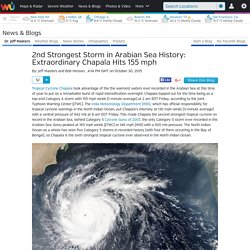
Chapala topped out for the time being as a top-end Category 4 storm with 155 mph winds (1-minute average) at 2 am EDT Friday, according to the Joint Typhoon Warning Center (JTWC). The India Meteorology Department (IMD), which has official responsibility for tropical cyclone warnings in the North Indian Ocean, put Chapala's intensity at 130 mph winds (3-minute average) with a central pressure of 942 mb at 8 am EDT Friday. This made Chapala the second strongest tropical cyclone on record in the Arabian Sea, behind Category 5 Cylcone Gonu of 2007, the only Category 5 storm ever recorded in the Arabian Sea. Gonu peaked at 165 mph winds (JTWC) or 146 mph (IMD) with a 920 mb pressure. Figure 1. Indonesia’s huge fires might be the worst climate change crisis on Earth right now.
This story was originally published by Mother Jones and is reproduced here as part of the Climate Desk collaboration.
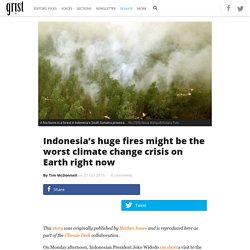
On Monday afternoon, Indonesian President Joko Widodo cut short a visit to the United States and headed home to oversee efforts to extinguish a rash of epic wildfires that have engulfed his country. Joko was in Washington, D.C., for a photo op with President Barack Obama, to talk about climate change, and to promote Indonesia as a choice venue for foreign investors. His trip was also supposed to include a stopover in San Francisco for meetings with tech industry executives. Fossil fuel companies aren’t just bad for the climate — they’re bad investments. Activists often use moral language when advocating for divestment from fossil fuel companies: It is wrong to participate in the destruction of our planet, say college students and the parishioners of liberal churches.
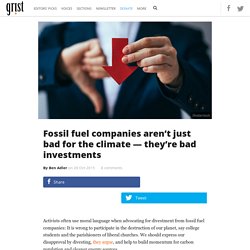
We should express our disapproval by divesting, they argue, and help to build momentum for carbon regulation and cleaner energy sources. But what if fossil fuels are just bad investments? What if oil, gas, and coal companies have sunk billions of dollars into buying up the rights to carbon fuels that they will never actually be able to extract? Indonesia is burning. So why is the world looking away? I’ve often wondered how the media would respond when eco-apocalypse struck.
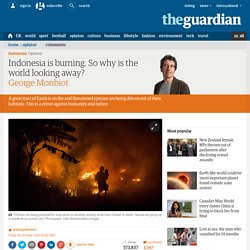
I pictured the news programmes producing brief, sensational reports, while failing to explain why it was happening or how it might be stopped. Then they would ask their financial correspondents how the disaster affected share prices, before turning to the sport. As you can probably tell, I don’t have an ocean of faith in the industry for which I work. This Could Be the Worst Climate Crisis in the World Right Now. Thick haze from forest fires shrouds the city of Palangkaraya in Indonesia on Tuesday.AP On Monday afternoon, Indonesian President Joko Widodo cut short a visit to the United States and headed home to oversee efforts to extinguish a rash of epic wildfires that have engulfed his country.
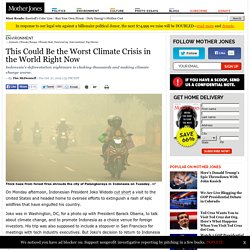
Joko was in Washington, DC, for a photo op with President Barack Obama, to talk about climate change, and to promote Indonesia as a choice venue for foreign investors. His trip was also supposed to include a stopover in San Francisco for meetings with tech industry executives. Ancient Permafrost Quickly Transforms to Carbon Dioxide upon Thaw (10/26/2015 3:00:00 PM) Researchers from the U.S.
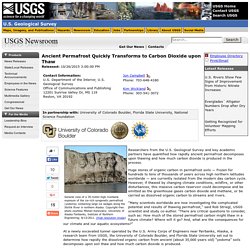
Geological Survey and key academic partners have quantified how rapidly ancient permafrost decomposes upon thawing and how much carbon dioxide is produced in the process. Huge stores of organic carbon in permafrost soils — frozen for hundreds to tens of thousands of years across high northern latitudes worldwide — are currently isolated from the modern day carbon cycle.
However, if thawed by changing climate conditions, wildfire, or other disturbances, this massive carbon reservoir could decompose and be emitted as the greenhouse gases carbon dioxide and methane, or be carried as dissolved organic carbon to streams and rivers. Ancient low–molecular-weight organic acids in permafrost fuel rapid carbon dioxide production upon thaw. Author Affiliations Edited by Jonathan J.

Cole, Cary Institute of Ecosystem Studies, Avon, NC, and approved September 28, 2015 (received for review June 16, 2015) Significance To our knowledge, this study is the first to directly link rapid microbial consumption of ancient permafrost-derived dissolved organic carbon (DOC) to CO2 production using a novel bioreactor. Rapid mineralization of the freshly thawed DOC was attributed to microbial decomposition of low–molecular-weight organic acids, which were completely consumed during the experiments. Article offert : Le nucléaire, une fausse solution pour le climat. Climatosceptiques : la science, le doute et le déni #DATAGUEULE 49. Climate change more catastrophic for the global economy than we thought. When it comes to climate change, the dark truth is that most people couldn’t care less about it crippling the environment.
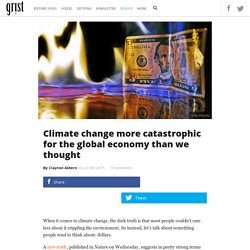
So instead, let’s talk about something people tend to think about: dollars. A new study, published in Nature on Wednesday, suggests in pretty strong terms that climate change will do some serious wallet damage on a global scale. On average, the authors predict we’ll see a 23 percent reduction in projected global output by 2100 due to climate change (relative to a world without it). Check out some of the prettiest (and most depressing) climate change data out there. 7 ways of looking at a climate Given ever-worsening hurricane news, the hottest September on record, and GOP obstructionism, it can be hard to get a handle on what’s even going on with our climate.
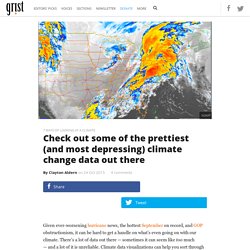
There’s a lot of data out there — sometimes it can seem like too much — and a lot of it is unreliable. Climate data visualizations can help you sort through the noise to get at the signal. Aux sources du Yangzi, château d'eau en péril. Du jamais-vu dans l'hémisphère nord. « Nous préparons la plus grande action de désobéissance pour le climat » Septembre 2015: le mois de septembre le plus chaud jamais enregistré.
Oslo wants to ban cars from city center and divest billions from fossil fuels. L'impact du changement climatique sur la santé - johnsson - Actualité, évènements. Changement climatique : vers un boom des maladies infectieuses. Réchauffement climatique : nous sommes loin du compte, pour l'OCDE. Another Life: Leaving it to the fertility gods is tempting destruction. At sunrise on one of the golden mornings the sheep and their pastures sparkled with dew.

Tapping briskly forth on the boreen, an ageing squire with an ash stick, I halted at the tracks of a couple of hares that had crossed not long before me. These were printed in dew, crisply black on the gravelly road, and took separate paths between well-worn notches in the field banks. Player. Take Action. COP21, the 21th conference of parties to 1992’s U.N. Framework Convention on Climate Change. United Nations (UN), convenes in Paris, France this December. Missing in large part however from both the UN and civil society discussion is the critical and hopeful message that small organic farmers and pastoralists can cool the planet and feed the world. The industrial food system accounts for approximately 30-50% of total greenhouse gas (GHG) emissions. Antarctic Ice Shelves Face Major Threat If CO2 Emissions Keep Rising. Marine Food Chains at Risk of Collapse, Study of World’s Oceans Finds.
By The Guardian – October 13, 2015 Important ecosystems could be massively damaged by 2050 unless greenhouse gas emissions and localized pollution is drastically reduced, researchers say By Oliver Milman The food chains of the world’s oceans are at risk of collapse due to the release of greenhouse gases, overfishing and localized pollution, a stark new analysis shows. A study of 632 published experiments of the world’s oceans, from tropical to arctic waters, spanning coral reefs and the open seas, found that climate change is whittling away the diversity and abundance of marine species. photo by SarahDepper, on FlickrStaghorn Coral (with evidence of coral bleaching) Hot Oceans Are Killing Coral Reefs Around the World. For the past year, the world’s corals have been getting increasingly pummeled by climate change. Now with El Niño kicking ocean heat into overdrive, much of the world’s oceans have turned deadly for the world’s corals.
On Thursday, the National Oceanic and Atmospheric Administration (NOAA) announced a global coral bleaching event. This year joins the ranks of 1997 and 2010 as the only times on record that bleaching has occurred in all three of the world’s oceans that support coral at the same time. Carbon choices determine US cities committed to futures below sea level. Author Affiliations Edited by James Hansen, Columbia University, New York, NY, and approved September 18, 2015 (received for review June 8, 2015) Significance As greenhouse gas emissions continue to rise, the window to limit global warming below 2 °C appears to be closing.
Changement climatique : rien ne sauvera Miami et La Nouvelle-Orléans. En Louisiane, l’avenir au ras de l’eau, par Elizabeth Rush (Le Monde diplomatique, octobre 2015) … et l'Arctique deviendra un océan. New finding shows climate change can happen in a geological instant. (Phys.org) —"Rapid" and "instantaneous" are words geologists don't use very often. But Rutgers geologists use these exact terms to describe a climate shift that occurred 55 million years ago. In a new paper in the Proceedings of the National Academy of Sciences, Morgan Schaller and James Wright contend that following a doubling in carbon dioxide levels, the surface of the ocean turned acidic over a period of weeks or months and global temperatures rose by 5 degrees centigrade – all in the space of about 13 years. Scientists previously thought this process happened over 10,000 years. The Methane Monster Roars.
Le monstre méthane rugit. Nicolas Hulot et son double bousculent la politique, Politique. South Carolina floods show how global warming is altering our weather. A bord du brise glace qui n'a plus de glace à briser (4) A New Global Tinderbox: The World’s Northern Forests by Ed Struzik: Yale Environment 360. Philippe Verdier, climatosceptique en chef à France Télévisions - Ma vie au poste.
CAT_global_temperature_update_October_2015. INDCs lower projected warming to 2.7°C: significant progress but still above 2°C - Climate Action Tracker.